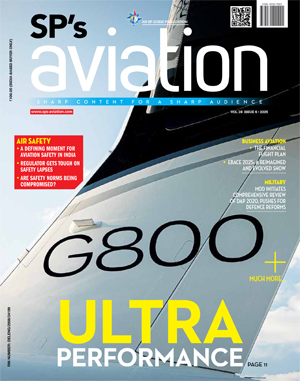INDIAN ARMED FORCES CHIEFS ON OUR RELENTLESS AND FOCUSED PUBLISHING EFFORTS

The insightful articles, inspiring narrations and analytical perspectives presented by the Editorial Team, establish an alluring connect with the reader. My compliments and best wishes to SP Guide Publications.

"Over the past 60 years, the growth of SP Guide Publications has mirrored the rising stature of Indian Navy. Its well-researched and informative magazines on Defence and Aerospace sector have served to shape an educated opinion of our military personnel, policy makers and the public alike. I wish SP's Publication team continued success, fair winds and following seas in all future endeavour!"

Since, its inception in 1964, SP Guide Publications has consistently demonstrated commitment to high-quality journalism in the aerospace and defence sectors, earning a well-deserved reputation as Asia's largest media house in this domain. I wish SP Guide Publications continued success in its pursuit of excellence.
- The layered Air Defence systems that worked superbly, the key element of Operation Sindoor
- Operation Sindoor | Day 2 DGMOs Briefing
- Operation Sindoor: Resolute yet Restrained
- India's Operation Sindoor Sends a Clear Message to Terror and the World – ‘ZERO TOLERANCE’
- Japan and India set forth a defence cooperation consultancy framework, talks on tank and jet engines
Big 2 Share Spoils, Bell Tolls for the A380
For Airbus, the Dubai Air Show 2017 was an occasion to celebrate as it packaged a gift for sales chief John Leahy days before his retirement

Armed with their cheque books, Aviation’s faithful came to Dubai Air Show 2017 for the 15th aero exhibition and recorded deals worth $113.8 billion.According to data compiled by financial consultants Mubasher, the event which is held once every two years in Dubai, had logged an all-time record high of $206.1 billion in its 13th edition held in 2013, whereas the second record high at $155.5 billion was achieved in 2007.The event in 2017 marked a 175 per cent surge in the value of deals signed compared to the previous edition held in 2015, which saw only $39.8 billion in agreements.
The first two days belonged to Boeing and it looked all but over for Airbus. Even their chalet was relatively silent and gloomy as the American manufacturer reeled in the orders. Emirates, as host carrier, set the pace by ticking the box for 40 Boeing 787-10 Dreamliners and this investment worth $15.1 billion, will replace the fleet of Boeing 777 as Emirates increases its frequency on the under ten-hour routes. Any misgivings over the ability of the Dreamliner to perform at peak levels in the heat of the desert, were set aside and the Airbus A350 which still has residual affection and a better range and cost-per-passenger aggregate, fell by the wayside. As Airbus saw no more than the shadow of a smile on the opening day, there came the double whammy with flydubai, now a registered adjunct of Emirates, picking up a $27 billion deal to purchase 225 Boeing 737 MAX aircraft, with options to buy an additional 50.
BOEING SAID IT SECURED TOTAL COMMITMENTS FOR 302 AIRCRAFT INCLUDING 50 OPTIONS WITH A VALUE OF ABOUT $50.7 BILLION AT LIST PRICES
Airbus could by then, have packed its bags and skulked off, but wait, there was a major trick left in the bag and souring the bubbly at Boeing was on the cards. Hours later, even as media and the aviation industry was empathising over the mauling Airbus was getting, came the mega announcement. It was the biggest deal in history and Indigo US was making it. Airbus gently and yet with a dash of soigné announced the securing of an order valued at nearly $50 billion for 430 planes from its single-aisle Airbus A320neo line. Suddenly the dimmed lights at Airbus went bright and life was good again.
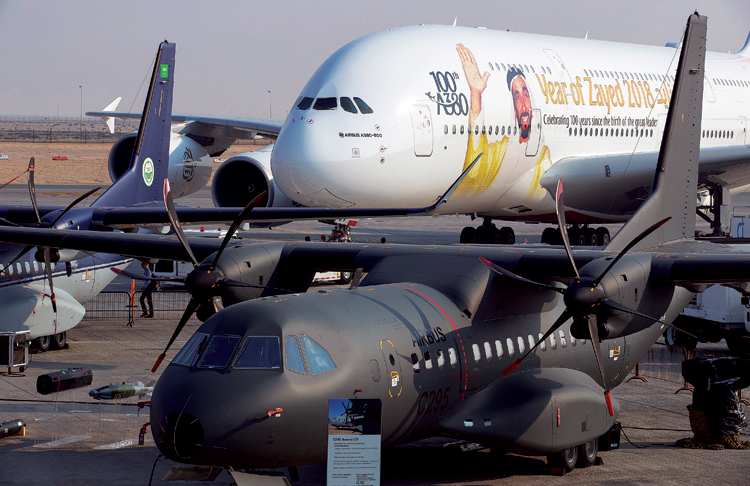
While the agreement added to the lure of Dubai as a leading venue for the bi-annual gathering and gave it a full chapter in modern aviation history, it also allowed Airbus to pump up a bottom line hurt badly by the loss of love for the Airbus A380. Actually it really is not a loss of love as much as it is a pragmatism reflected by Airbus having to guarantee Emirates ten-year production of the behemoth if there was any chance of getting Emirates to buy more aircraft.
For the moment, despite the excitement, it was an in-house celebration for Airbus as it packaged a gift for sales chief John Leahy days before he flies into retirement. The pair of giants had shared the spoils again. One calls them a pair advisedly because they work it out so they end up with equal shares of the market. Of course what all this means is that the show is a success. The main stars have their lines right and everyone who is anyone, is engaged in an orgy of backslapping one another on a job well done.
Many factors will kick in before the planes materialise in the skies with the livery of those who have gone in for them. As of now, the hard facts are that the bells you hear could well be the death knell for the A380 production line. Airbus has to be sorely wounded by the loss of the A350 option to Emirates when they could have had a solid deal in the bag that would have cold compressed the A380 bruising. But without it, the scuttling of the double decker flagship is twice as hurtful.
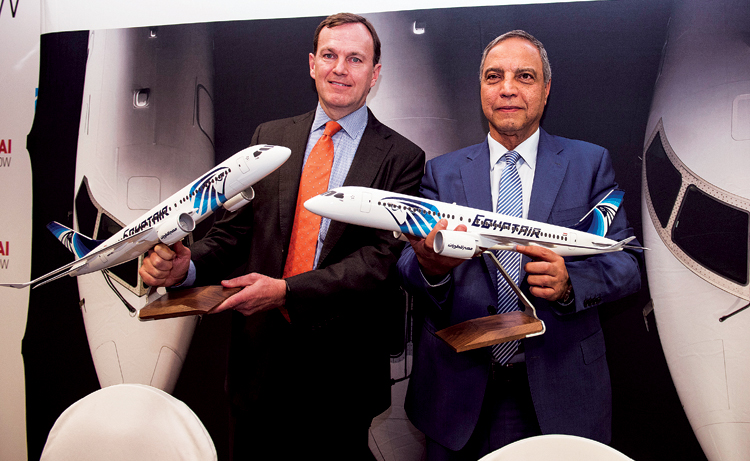
The $2 billion needed to extend the wings by 15 feet, improve the range, reduce the per passenger cost effectiveness by 13 per cent and make the aircraft viable to its best customer, is blowing in the wind because without other customers the sums do not add up. a And there is no one knocking on the door.
The general belief now is that with Emirates hedging its bets and being frontal and transparent in its demands, Airbus will return to Toulouse in an ambivalent frame of mind, ready to make the cruel cut and mothball its A380 production line.
The comfort from Indigo’s largesse is still in the MOU stage and not signed and sealed so there can be many changes to what Bill Franke at IndiGo Partners finally picks up for his carriers: Frontier Airlines, Volaris, Wizz Air Holdings and JetSmart, the last now operating out of Chile.
It is a toss up how many of the 273 Airbus A320neo jets and 157 of the A321neo variant will finally be picked up and much will depend on the oil prices, peace in the region, liquidity in the carriers in the Middle East and how the projected need for 10,000 new aircraft across the size spectrum pans out with the flying public. It has to be remembered that Qatar is already hurting by virtue of political isolation, Etihad has had two rough hits through its investments in Air Berlin and Alitalia and there will also be competition from airlines exercising the fifth freedom to fly between two foreign countries on a flight originating or ending in one’s own country. Add to that the unofficial but widely practiced sixth freedom of flying from one foreign country to another while stopping in one’s own country for non-technical reasons and regional carriers are not going to find it easy. With India, China and the ASEAN belt expected to be the new emerging markets, the attention of the industry will engage in a tectonic shift.
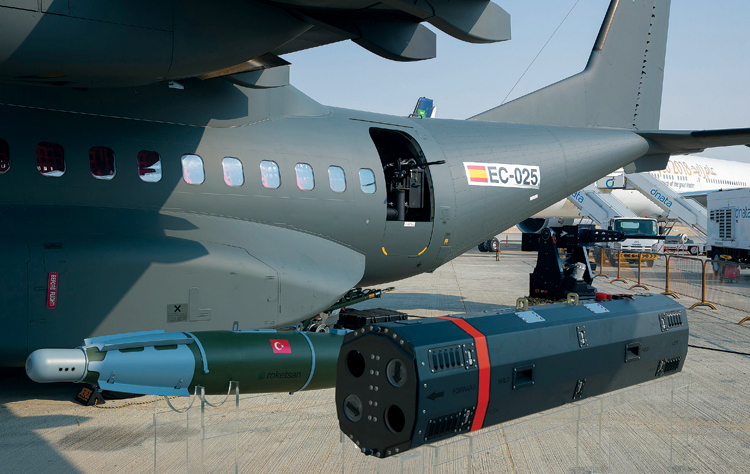
In other deals, Bombardier signed a letter of intent with Egyptair for the purchase 24 CS300 jets from Bombardier and Watanya Airways took the first step towards a possible 25 Airbus A320neo aircraft to Golden Falcon Aviation, its exclusive aircraft supplier.
In a breakdown given by Mubasher, the delas per day make for impressive reading. On the first day of the Dubai Air Show, deals signed amounted to $19.34 billion, while on the second day, companies signed agreements worth $3.8 billion. The third day saw deals worth $7.1 billion being concluded, while the fourth marked the highest value of agreements signed for $77 billion. The fifth and final day of the Dubai Air Show saw a $1.23 billion in signed agreements.
Airbus and Boeing came away with orders of 695 planes worth $92 billion of which Indigo helped the French manufacturer pull in 510 aircraft of which 502 were from the Airbus A320neo family and the rest were for the company’s multi-role C295 transports and ‘H generation’ H160 rotorcraft with a price tag of $58.3 billion, according to Airbus.
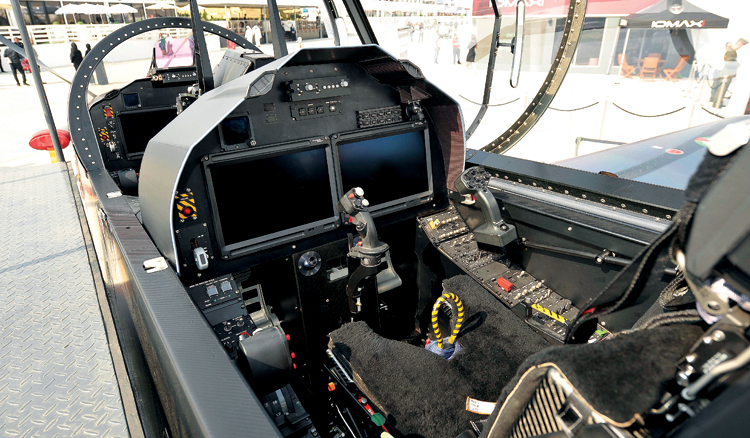
Boeing, however, said it secured total commitments for 302 aircraft including 50 options with a value of about $50.7 billion at list prices. It also signed agreements with Azerbaijan Airlines, Alafco and Ethiopian Air. Meanwhile Air Arabia signed for the lease of six Airbus A321neo to augment its fleet. And as the 160 aircraft on static display took off for home, there was good reason for Dubai to feel satisfied.
Now time will tell if the figures will be infused with life.
US open to F-35 sale to UAE
An exciting dimension during the Air Show was centred on the tangible interest shown by the UAE in opening talks over the F-35 Lightning II and the readiness of the US to sit at the table. This fifth-generation fighter will be a game-changer and could well turn the rest of the pack into obsolete mode. Even though this is just a start, the other jab in the arm for the Emirates came from the call for an upgrade in the Mirage fleet. The 42 planes that have been in service since 2003 will undergo a refit although details of the project have not been disclosed.
THE F-35 LIGHTNING II, A FIFTH-GENERATION FIGHTER WILL BE A GAME-CHANGER AND COULD WELL TURN THE REST OF THE PACK INTO OBSOLETE MODE
There was also considerable interest over Malaysia’s intent for a maritime patrol aircraft (MPA) when it announced that this surveillance fleet was its number one priority. This light combat aircraft would have exceptional air-to-ground capabilities and, as of now, the Korean KA-50 looks the winner even though a sweet deal could have other manufacturers offering to replace the recently grounded MiG-29 fleet.
Also of interest at the Air Show was Boeing initiative in pitching the KC-46 tanker to this region and the company is confident it will gain a foothold in this segment although issues in flight tests have delayed the schedule for the latest version. Boeing is of the opinion that just the refueling in flight needs of the Saudi forces is a viable market in itself.
Meanwhile, the KC-390 from Embraer arrived in Jacksonville for a comprehensive testing programme which includes evaluating avionics systems, assessing its performance in crosswind operations and measuring its external noise. Once it gets its certification it will be another contender in the global market.
In the interim, work on the A400M transport aircraft is moving along nicely although the need to certify the modified gearbox following discovery of a crack in one of them, will take a little longer and is unlikely to be resolved before early 2018.
Opportunities for sales in the future
Bombardier Commercial Aircraft confirmed that it signed a letter of intent (LOI) for up to 24 CS300 aircraft with EgyptAir Holding Company of Cairo. This includes 12 CS300 aircraft with purchase rights for an additional 12 aircraft at a cost of $1.1 billion for the first deal. As it showcased this series in Dubai, another manufacturer Hondajet took to the skies and established a good relationship with potential customers for its fast selling small bizjet. The most delivered jet in its category for 2017, the aircraft was positively received by sheikhs and corporate executives in the Middle East. With the concentration largely on the Boeing–Airbus divide of the spoils, the other players namely Bombardier and Embraer, recorded no sales; but used the occasion to engage in some ground work for the near future.
For Embraer, it was an opportunity to talk to several as yet undisclosed Middle East carriers for small aircraft to ply short haul regional routes. With the Embraer E2 family of aircraft on the cusp of certification, it was no surprise that the Chief Executive Commercial Aircraft John Slattery looked pretty chuffed with the current round of negotiations.
Meanwhile, Gulf Air signed a $1.9 billion LEAP-1A engine and services agreement with CFM. The UAE Armed Forces went in for five CN295 military transport aircraft with related services from Spain’s Airbus Defence and Space company for $250 million.





